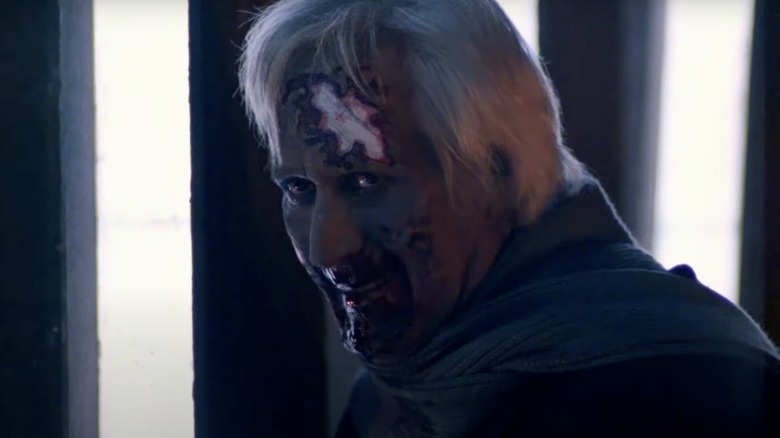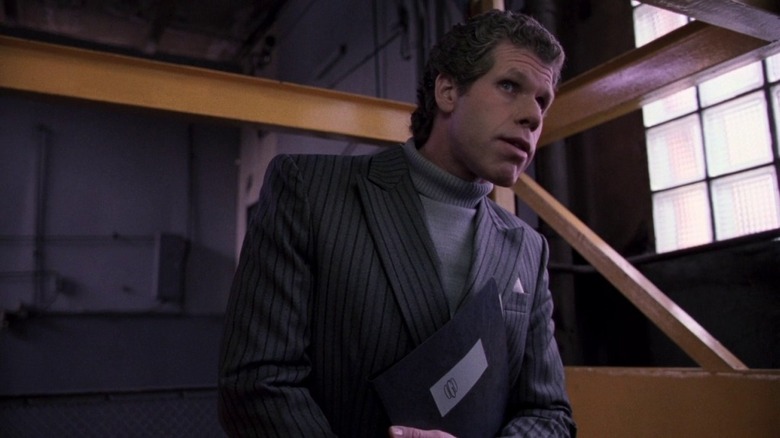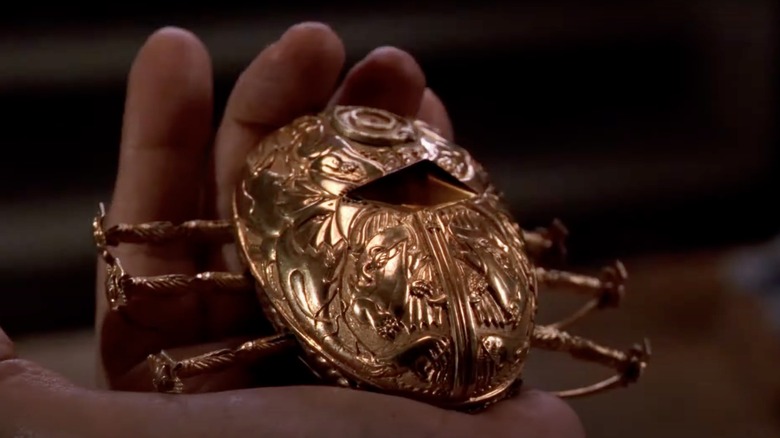Year Of The Vampire: Guillermo Del Toro's Cronos Reimagines Forever As A Gold Invention
(Welcome to Year of the Vampire, a series examining the greatest, strangest, and sometimes overlooked vampire movies of all time in honor of "Nosferatu," which turns 100 this year.)
Guillermo del Toro's filmography and frequent collaboration with actor Ron Perlman began almost thirty years ago in an antique shop, where clocks are always ticking in the background and cockroaches come crawling out of the eye of an archangel statue. That seems symbolic somehow, as the does the white-haired shopkeeper's name, Jesús Gris (Federico Luppi), which could be translated as "Jesus Grey" ("Gris" is the Spanish word for "grey"), but in the context of "Cronos," del Toro's 1993 directorial debut, it also evokes such things as the gris-gris, a kind of protective amulet or talisman.
The one in "Cronos" looks like a golden Fabergé egg with legs. It's a mechanical scarab beetle that affixes its stingers to one's hand or heart, piercing the flesh and conferring immortality upon its host. The protection here comes from death itself, the thing that lies on the other end of all those ticking clocks. In this way, the film eschews pointy fangs to offer the most unique vampire bite you'll ever witness.
"Cronos" never uses the word "vampire" — in English or Spanish — but all the trappings of the monster are there. Our resident Mr. Grey, Señor Gris, develops a sensitivity to sunlight and a thirst for sangre (blood), and his kind can only be killed when something stakes them through the heart. He also sleeps in a makeshift coffin in a room shared by his almost mute (if not yet fish-man-loving) granddaughter, Aurora (Tamara Shanath), who clings to a teddy bear as her abuelo sheds his skin, snake-like. Here, as in other del Toro films, the sentimental lives in harmony with the monstrous.
What it brought to the genre
"Cronos" was the first in a trilogy of Spanish-language horror films from del Toro, to be followed by "The Devil's Backbone" and "Pan's Labyrinth." But it was also the first in a trilogy of vampire-related projects from him that would include "Blade II" and the FX series "The Strain." It brought the maestro (and namesake of Guillermo on FX's "What We Do in the Shadows") to the genre — along with a renewed arthouse sensibility in the tradition of Bill Gunn's "Ganja & Hess," where a ceremonial African dagger does the "biting" instead of a beetle, and Carl Theoder Dreyer's "Vampyr," a movie that del Toro once called "as close as you get to a poem in film."
The movie is open to interpretation; the iTunes description of it, for instance, describes it as "an allegory about US/Mexican relations." You can certainly see how one might arrive at that interpretation. Perlman's English-speaking American, Angel de la Guardia, whose name translates as "Guardian Angel," brutalizes the kindly old Gris and pushes his car off a cliff. He and his uncle Dieter (Claudio Brook) want the thing that Gris has and they're not afraid to savagely beat him to get it. Angel even strikes a baseball bat pose, as if to signal that America's true favorite pastime is bullying.
Speaking to The New York Times back in 1994, however, del Toro said "Cronos" wasn't meant to be political. This is the same interview where he identified himself as "a raging atheist" and related some of his formative experiences growing up with a half-deaf Catholic grandmother who made him "walk to school with bottle caps in his shoes," as the Times put it. Having background knowledge of biographical details like these helps illuminate the perspective that informs "Cronos."
'I am Jesús Gris'
The Criterion Collection essay on "Cronos" further reveals that del Toro's grandmother twice tried to exorcise him, noting that he has compared her to Piper Laurie's fanatical religious mother in "Carrie" (though his relationship with her also reportedly served as the model for Gris and Aurora's relationship, which presages the central love story in "The Shape of Water," with its similar mute inflections). It offers up a different interpretation of "Cronos" as "a tale about the seductiveness of the idea of immortality."
In "Cronos," Dieter describes the grinding gold clockwork automaton — a bit of window-dressing that would show up again in "Hellboy II: The Golden Army — as "an invention that prolongs the life of the person who uses it. But there are rules, precise and very strict rules..."
This almost sounds like a description of religion on the part of del Toro, the screenwriter. Dieter goes on to say that "an insect is trapped in the device" and that "insects are God's favorite creatures," as if Catholicism and its vampiric blood-drinking rituals were, in del Toro's eyes, just an ornate construct that imprisons the beating heart of a living thing. Dieter then compares Christ walking on water to a mosquito and the resurrection to ants and spiders that "can remain inside a rock for hundreds of years until someone comes along and frees them."
Gris tells his granddaughter that Dieter thinks the device will help him live longer, but he personally repudiates it, saying, "I don't give a damn about eternity. I don't want to live forever." His final declaration, "I am Jesús Gris," which he repeats three times over — not as a denial, but as an affirmation — cements him as a creature of this earth, caught between black and white, darkness and light.


